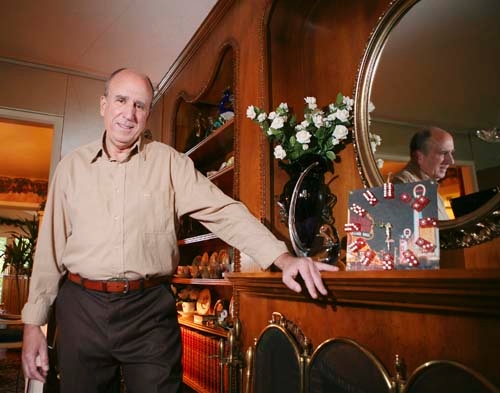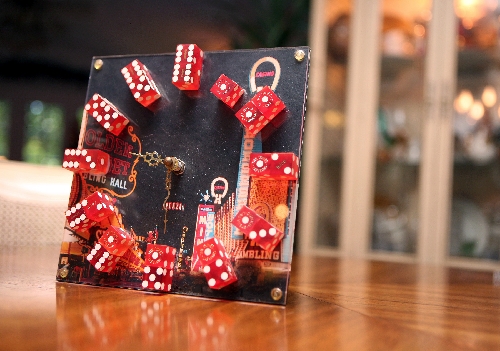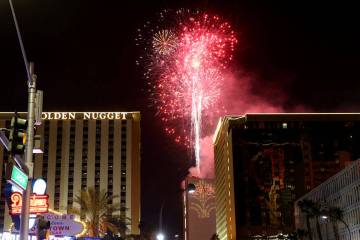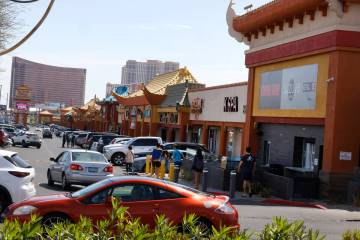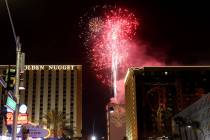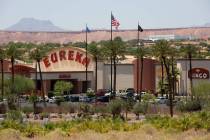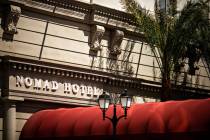Dice clock traces origins to vintage Vegas
Circa 1968 Las Vegas: The Strip was sparsely dotted with casinos, among them the Stardust, Sands, Caesars Palace and Dunes. It was a time when patrons could pull up to the front door of a casino, valet park their Pontiac GTOs and walk right into a joint with no hassle.
Parking garages weren't yet a thing, and if you tipped the right people well, you could have the world in your hands. This was Vegas, baby.
This is the town that gave the world the casino dice clock, regardless of who you believe created it.
Back then, Las Vegas souvenir shops largely created and sold their own merchandise. One of the companies in town, Miller Novelty Co., was run by Harold "Hal" Miller, who moved his family to Sin City in 1959 to capitalize on the burgeoning Las Vegas souvenir market.
Miller's son, Steve, was a 20-something sales manager for the family business when his father challenged him to create something new.
"I took him up on the challenge, but I thought it was a joke," said Miller, whose other claim to fame is a stint as a Las Vegas City Councilman.
Miller took a piece of black plastic, an "old" battery block motor, affixed gold clock hands to the plastic and attached old casino dice to the face where numbers traditionally would be.
And as Miller tells it, his dad looked at the finished product and said, "That's a piece of shit. No one would ever buy that. You're going to insult your customers."
But the young man felt he was on to something.
direct marketing worked
Miller took the clock to Paula Petersen, who ran the gift shop at Westward Ho. The hotel, which opened in 1963, sat on 15 acres and featured a 35,000-square-foot casino, a 900-seat showroom, lounge, restaurants and gift shops.
Petersen called her casino manager and told him to give Miller 1,000 pairs of Westward Ho dice and placed an order for the finished timepieces. Miller charged $15 per clock, each of which took $23 die to make.
The elder Miller called in the troops to the assembly line, and the family got to work.
"We made the first dice clocks for Paula Petersen ourselves," Miller said. "Then, as the years went by, we made them for each hotel with their own dice."
Miller said he paid "thousands" for big boxes of dice from the casinos, which he used to make branded clocks specific to each property.
"They wanted them to be the advertisements for the hotels," Miller said.
The casinos charged him 25 cents a pair for cancelled dice. Cash only. This is Vegas, after all.
But, not all the dice deals happened in the light of day. Sometimes he had to go to the casino in the middle of the night and pay off a manager, a security guard or whomever he could to get him the dice.
One night in particular stands out: The casino manager at the Riviera didn't want anyone to know he was selling hot dice, so Miller used a bellman's cart to wheel the boxes off the floor, trying not to be noticed.
Of course he stumbled, and 3,000 Riviera dice rolled onto the casino floor.
"The casino manager almost had a coronary," Miller said with a laugh.
business grew
Miller's casino dice clock hustle lasted almost two decades. His father died in 1984. Three years later, Miller got out of the souvenir business, which had grown to include dice clock sales in Atlantic City, Las Vegas and Laughlin. He estimates he sold almost 1 million clocks, at $15 wholesale. Tourists paid the casinos and gift shops $29.95.
While Miller has the tales to support his creation of the casino dice clock, others in Las Vegas credit Reve White, a stand-up comic and musician who died in 1995.
"I believe he created the one with the rounded-edge dice. I began in the late '60s with the casino dice," responded Miller. "We didn't consider those to be competitive to ours."
All of Miller's originals featured black or white 9-inch-square backgrounds, with used, red casino dice complete with the Nevada Gaming Control Board's scrag mark signifying the dice were used and had been canceled. The hands were gold, and bore the words "Fabulous Las Vegas" in gold leaf.
In 2005, the Review-Journal reported that White had made a dice clock for a gambler at the Sahara sometime in the late 1960s. Word spread, and others asked for one of their own, which was perhaps the actual invention of the clock.
Back then, George Harris, former owner of Shooting Star Souvenirs, told the paper that Miller takes credit for the clock, but White was the actual creator.
While we may never know who came first, we do know that since the original clocks were created, numerous variations have been made, including those with turquoise backs and blue dice and red-backed clocks with white dice.
By the early '70s, two or three companies were manufacturing the clocks. Today, the clocks can be found on Ebay, Etsy and of course, in Las Vegas souvenir shops.
"They're very popular. It's a very Vegas souvenir," said Angie Hurt, manager of the Bonanza Gift Shop.
The late comedian Redd Foxx even purchased one as a birthday gift for his wife while performing at the Sahara.
Bonanza Gift Shop, which carries every color and motif imaginable, sells about 200 clocks each month. Hurt said her supply is made locally from "several sources," but that she said she can't release specific vendor information.
Contact reporter Laura Carroll at lcarroll@reviewjournal.com or 702-380-4588.



